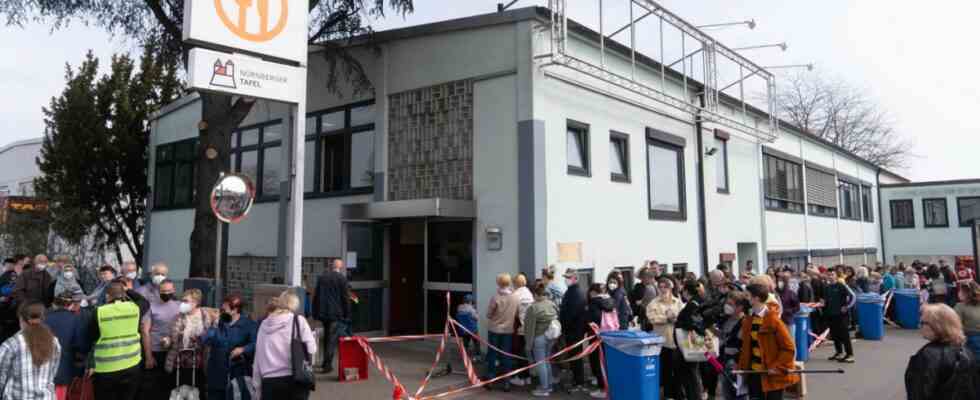According to Peter Zilles, the Bavarian food banks have never experienced such an influx. Yes, in 2015 many refugees came and took advantage of the support in addition to those who were already in need. But this time, it’s different. “Back then, people came rather slowly one after the other, now we’re being overrun,” says Zilles, the chairman of Tafel Bayern e. V
He describes the situation as “tense”, the food banks are reaching their limits and food is scarce. Which is hardly surprising considering the current rush, as can be seen in Nuremberg, for example. About 4,000 people usually come there to pick up free groceries and hygiene items. Last week, says Zilles, an additional 3,150 people from Ukraine were there. “Almost 80 percent more,” he calculates.
“The word tense is right,” says Johannes Stieg, the deputy head of the Nuremberg food bank. The almost exclusively voluntary workers – often older – could not do much more than at present. Normally, the daily food distribution is open between 1 p.m. and 4 p.m., most recently on Tuesday from 12 p.m. to 6.30 p.m. because of the many people in need.
The first people from the Ukraine were already at the door at half past seven in the morning, hoping to be the first in line. It is true that there is “reasonably enough” food available in Nuremberg, although there is a lack of meat and cold cuts. But the big problem here, says Stieg, is the strain on the employees. “We’ve been through it for five weeks now, but we don’t know how much longer it will go on.”
There is also uncertainty elsewhere, and the situation is at least sometimes challenging. According to Peter Zilles, a query of all Bavarian food banks – that’s 172 – brought about 130 responses and only nine answered that the arrival of people from the Ukraine currently has no influence on the supply. The others were “sometimes very massively” affected.
Food has to be rationed due to lack of supplies
In concrete terms, this means something like: The helpers have to ration because there is no food. That sometimes leads to discussions, says Zilles, which of course nobody can use in such a situation. The volunteers have to “constantly justify themselves” if certain products do not exist or only too little of them.
Heinrich Fesl, who runs the table in Vilshofen an der Donau in the district of Passau, also notices how tense the situation is every Wednesday. Usually 70 families come to the food distribution there, due to rising food prices there have been 100 recently and due to the refugees in the past week another 28 more. Some of them did not yet have any entitlement certificates, according to Fesl they received food first from the five voluntary Vilshofeners per issue day. This has led to resentment among some “regular customers”.
“We’re slowly reaching our limits,” says Fesl. He actually relates this to the amount of food available, but it also applies very fundamentally: there is the language barrier that exists despite interpreters, there is the ongoing pandemic, which is causing concern for the older helpers in particular. But, nevertheless: Since the beginning of the war, they have noticed an increasing willingness to donate in Vilshofen.
And despite all the difficulties, Tafel boss Peter Zilles also has something positive to report: Since January, a new central distribution center has been in operation in Bad Aibling (Rosenheim district) on the former US military site. From there, the individual regional food banks can pick up the products they need. This has been well received, reports Zilles, and a digital platform is currently being created that will help the food banks to see the availability of goods. If the platform were already working, according to Zilles, it would primarily show vacancies.

